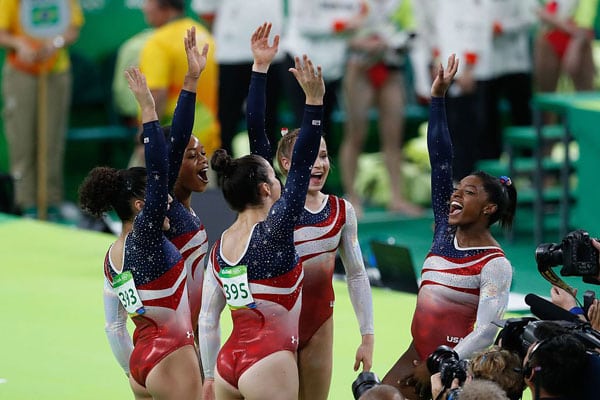
May 29, 2018; Vanity Fair
“Female gymnasts still embody the fantasy of childhood innocence amid superlative physical accomplishment,” writes Vanessa Grigoriadis in Vanity Fair. But, adds Grigoriadis, in the wake of the Larry Nassar sexual abuse scandal, gymnasts “have also become bellwethers for our evolving views on femininity, agency, and sexual abuse.”
At NPQ, we emphasize the importance of shifting narratives and culture to make lasting social change possible. Because of its high profile, at USA Gymnastics, we have seen this process of reshaping stories and culture unfold publicly in real time. The cultural change lens is explicit, Grigoriadis notes. The central goal, Grigoriadis writes, of Aly Raisman and other US women gymnasts like Jordyn Wieber is to “engineer a vast redesign of her sport’s culture.”
Earlier this year in NPQ, Susan Bales wrote that, “Successful movements are about meaning-making.” The ones that succeed, Bales added, “focus our attention on the social systems and structures that need to be fixed by revealing how they impede the outcomes we value.” In the case of the gymnasts, this has required calling out how institutions enabled abuse to occur and persist, as well as working to elevate athletes’ voices and change sports cultural norms.
So far, at an institutional level, as Grigoriadis points out, resignations have included “USA Gymnastics president Steve Penny and its entire board of directors; the president of the United States Olympic Committee, Scott Blackmun; and the president, athletic director, and other employees of Michigan State University, where Nassar was an assistant professor of osteopathy and practiced at a sports-medicine clinic.” Earlier this month, too, Michigan State agreed to a $500 million settlement, with $425 million to be paid out to 332 women affected, and the remaining $75 million to be held in reserve for additional possible claims.
“And yet we are still in the early days of accountability for this tragedy,” Grigoriadis observes. Even financially, gymnasts still have outstanding claims against USA Gymnastics and the US Olympic Committee.
Changing the sport’s culture is not easy. As Grigoriadis writes, an underlying belief system enabled the abuse—namely, that it was worth “any price” to pursue Olympic gold. Indeed, an article published last year in Deadspin bore the headline, “The US Gymnastics System Wanted More Medals and Created a Culture of Abuse to Get Them.”
Wieber has this response to that “win at any price” attitude:
I think there’s a way to make Olympic champions that’s not abusive. Maybe we will go down a little bit in the rankings before we go up just because of the lack of organization and all the things that are going on. The next couple years are going to be stressful for USA Gymnastics and the athletes….But I cannot believe that you have to be sexually, emotionally, and verbally abused to win Olympic medals.
Sign up for our free newsletters
Subscribe to NPQ's newsletters to have our top stories delivered directly to your inbox.
By signing up, you agree to our privacy policy and terms of use, and to receive messages from NPQ and our partners.
Raisman says she hopes one day everyone “will be educated and able to protect themselves from predators like Larry, so they will never, ever, ever have to say the words ‘me too.’”
As Grigoriadis details, Nassar did not act alone. Rather, he acted within a system that involved 20 elite women gymnasts, most still of high-school age, going away from home “every four to six weeks…to an obscure location…for a five-day practice session.” Control by coaches was near total; athletes feared they might be “kicked off the team for being complainers.” Jennifer Sey, a former national gymnastic champion and author of Chalked Up, published in 2008, notes that, “The gymnasts had no institutional voice in the sport at all.”
Some institutional changes have now been made. USA Gymnastics “closed the ranch. It is also working with SafeSport, a new Denver-based center that will process any future abuse claims on Olympic teams, [and] they have expanded the list of banned coaching behaviors to include not only sexual abuse but also verbal and emotional abuse. It now not only permits parents or another chaperone to travel to camps and competitions with their daughters—it requires it.”
Aimee Boorman, former coach of Olympic all-around champion Simone Biles, advocates instilling a model of “positive coaching” that “involves using your resources to help increase an athlete’s skill, while nurturing them to understand that success comes from within.”
Raisman lists some of her desired changes:
We need to have a fantastic female doctor, a couple of them at that. Great female athletic trainers. Massage therapists, female ones. A sports dietician, a really good one, to educate the coaches and also the athletes. Get a psychiatrist that’s completely separate from USA Gymnastics and will keep what the athletes say confidential.
Raisman, adds Grigoriadis, is also “asking adults who coach kids to complete an online course with Darkness to Light, a nonprofit dedicated to fighting sexual abuse.”
Wieber, who is now a gymnastics coach herself, says leveling with athletes is also important. “From what I’ve heard, a lot of college programs aren’t even talking about [Nassar]. At UCLA, we have decided that we need to talk about it.”—Steve Dubb











